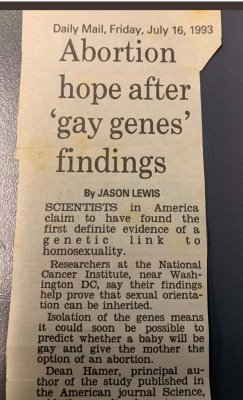The 'Gay Gene' Is a Total Myth, Massive Study Concludes
No individual gene alone makes a person gay, lesbian or bisexual; instead, thousands of genes likely influence sexual orientation, a massive new study of the genomes of nearly half a million people suggests.
Across human societies and in both sexes, between 2% and 10% of people report engaging in sex with a member of the same sex, either exclusively or in addition to sex with a member of the opposite sex, the researchers said. The biological factors that contribute to sexual orientation are largely unknown, but many scientists suspect that genetics plays a role, given that same-sex sexual behavior appears to run in families and is seen more often in identical twins than in fraternal twins.
But a precise genetic basis for sexual orientation has been elusive, largely because scientists previously had relatively small groups of volunteers to investigate. ...
"Because it is a controversial topic, funding has historically been limited and recruitment of participants was difficult," study co-author Fah Sathirapongsasuti, a senior scientist and computational biologist at the genetic testing company 23andMe, told Live Science. Same-sex orientation remains criminalized in more than 70 countries, some with the death penalty, often stifling those willing to disclose such personal information.
The new study, however, included a much larger number of participants, making the results more statistically reliable than those of the previous, smaller studies. In the largest genetic study of sexual orientation to date, scientists studied a group of about 470,000 volunteers in the United Kingdom and the United States who reported on whether they had ever engaged in same-sex sexual behavior. They relied on genetic data from the UK Biobank (a long-term health and genetics study running in the United Kingdom) and 23andMe, as well as responses to surveys asking questions about sexual identity, attraction, fantasies and behavior.
"To give you a sense of the scale of the data, this is approximately 100-times-fold bigger than previous studies on this topic," study lead author Andrea Ganna, a researcher at the Institute for Molecular Medicine in Finland, Massachusetts General Hospital and Harvard Medical School ...
The researchers could not find any one gene linked with same-sex sexual behavior. Five genetic variants did appear significantly linked to sexual orientation, and thousands more also seemed involved to a lesser extent.
In the end, the scientists could not find any genetic patterns that could be used, in any way, to identify a person's sexual orientation. Instead, the predisposition to same-sex sexual behavior appeared influenced by a complex mix of genetic and environmental influences. That's also the case for many other human traits, such as height.
"It's effectively impossible to predict an individual's sexual behavior from their genome," study co-author Ben Neale, a statistical geneticist at the Broad Institute of MIT and Harvard, told Live Science.
However, the finding that there's no single gay gene does not mean that sexual orientation is not genetic or biological, and is therefore a lifestyle choice.
"This is wrong," study co-author Brendan Zietsch, a geneticist at the University of Queensland in Australia, told Live Science. "We find that there are many, many genes that predispose one to same-sex sexual behavior. Each of them individually has a very small effect, but together they have a substantial effect. ...





